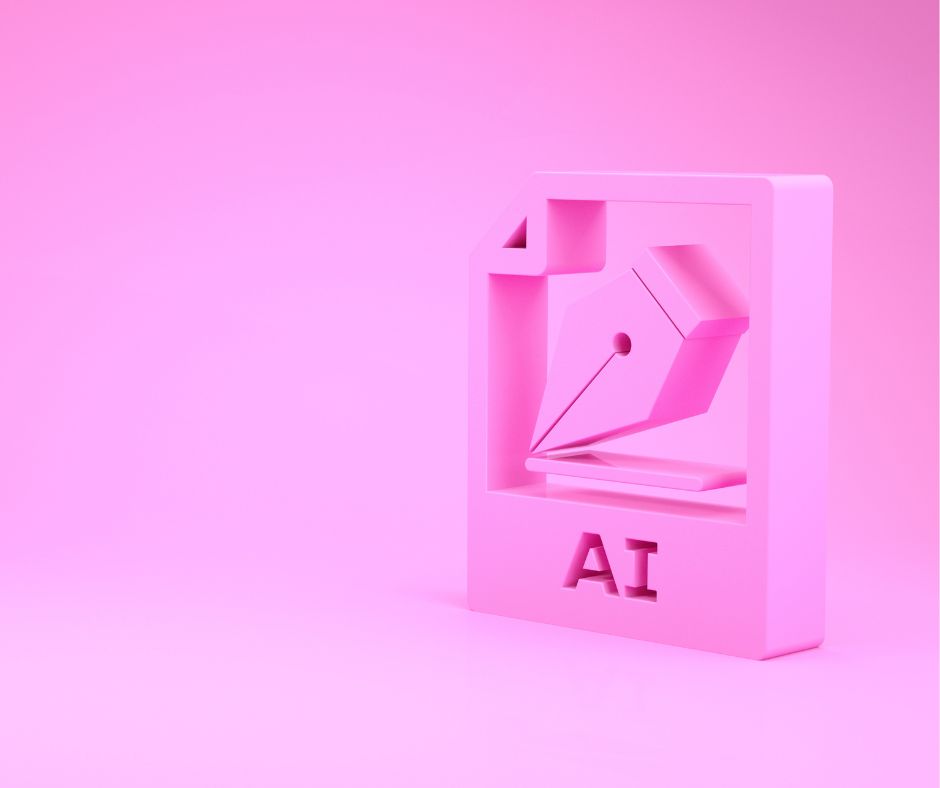AI as a Tool, Not a Threat: Author Concerns and What to Do About It

Some authors are excited. Others heads are exploding. Why? AI.
Find out common concerns and how you can adapt to an AI world. You can read this post below the video.
I did a post on AI tools for authors, but since then, AI has become such a powder keg of controversy. I’ve met people who’ve been kicked out of social media groups for mentioning AI.
On the one hand, I can understand the concerns anti-AI authors have. I have a few of my own. But on the other hand, AI is here. There’s no stopping it any more than there was stopping the development of the car that impacted buggy makers or streaming entertainment that has impacted DVDs, which impacted VHS.
I want to cover some of the concerns and fears surrounding AI and provide tips, strategies, or coping skills in a changing world.
You may not agree with what I suggest here, which is fine. But what I don’t think can be disputed is that AI is here. It’s not going anywhere. As authors, we need to accept and adapt. I hope this information will help you with that.
Concern One: AI-generated content will replace human authors.
Will their be 100% AI generated books for sale. Yes. There already is. Will AI-generated books replace human authors? I don’t think so. Readers read. They read more than one book. They read more than one author. They don’t care how it was produced as long as it’s a good story. And right now, humans write stories with more emotional depth than AI. AI fiction is a bit like AI generated speech; there’s something stiff and unemotional about it.
Will that change as AI improves, maybe. Probably. But that doesn’t mean it will replace human authors. Think of AI like a ghost writer. Many publishing entrepreneurs hire ghost writers to create their books. Are you afraid of them too? Probably not.
Special note: If you’re a ghost writer, like I am, then you may need to thinking ahead about your future as a ghost writer. I have a great client, but she is an entrepreneur, and as AI improves, it’s possible she’ll decide it’s a better move to use AI.
Concern Two: Increased accessibility to AI writing tools will flood the market with low-quality content.
I want to tell you a story. Once upon a time, the only way to get your book into the world was to either be traditionally published or pay thousands of dollars for vanity publishing and figure out a way to sell your books from your garage. Then one day, the Internet came, and not long after, came print-on-demand and ebooks. Publishing was faster and cheaper than ever. And then, Amazon and Barnes and Noble and other online book retailers opened up their stores to would-be authors to publish their works directly, without a traditional publisher. Now anyone could write, publish, and sell their books. And so many did!
But there were some who didn’t like this. Many traditional authors scoffed at indie authors, saying they couldn’t write well enough to get a traditional publisher so their books had to suck.
I tell this story because some anti-AI authors sound like the traditional authors at the start of self-publishing. They’re getting upset at having to compete with low-quality books flooding the market.
Will there be sucky AI books. Yes. But none of that stops you from writing, publishing, and selling books. What a lot of authors seem to be forgetting is that success as an author comes from the reader. The key factor of making a living writing is YOU finding your readers.
It’s important to realize what has been learned in the last ten to fifteen years as self-publishing has flourished. Is there low content? Yes. But there are also fantastic writers out there. We learned that readers don’t care if a book is traditionally published. All they want is a good story. And if you can provide that, then you can win whether there is AI content or not.
Concern Three: AI might lead to an oversaturation of content, making it harder for authors to gain visibility.
In some ways, the answer to this concern is the same as above regarding low-quality content. Back when self-publishing started to take off, many traditional authors fussed about them saturating the market. And guess what. They did. And we’ve learned there is room for both indie and traditionally published authors because again, readers don’t care about that. They just want a good story.
Is the market flooded? Yes. There are many indie authors making money hand over fist. Many more are making enough to live on. Most make a few bucks. But guess what? That’s true of traditionally published authors as well. From that, we can extrapolate that AI-authors will experience the same.
Will there be more noise with AI-created content? Yes. But self-publishing already produces a lot of noise. The noise has been there for over a decade. The reality is that the difference between authors making a living and those who don’t has little to do with the number of books in the marketplace. It has to do with how well they can find and engage readers. And in fact, AI tools can help you do this!
Concern Four: AI algorithms may prioritize popular trends over originality and diversity.
I’ll be honest, I don’t get this concern considering the number of self-published romance authors who write to market (writing trends). Even traditional publishers are always looking for same, but different.
Again, this worry forgets the most important element in an author’s career…the reader. So what if AI prioritized trends over diversity? All that matters is what your reader wants to read and it’s clear by the success of indie authors that readers like originality and diversity.
Concern Five: Plagiarism and copyright infringement may become more prevalent with AI-generated content.
Someone, somewhere is going to steal and try to sell your book. Often they won’t even plagiarized. They’ll just take your book and sell it themselves. It happens. It’s like playing whack-a-mole to stop it.
This AI concern is a little different from that, but just like authors have to deal with stolen works, you’ll have to concern yourself with plagiarized content in AI. But already there are solutions. If you’re an honest sort, using AI to help you write, you’ll run your content through a plagiarism checker. Many of the AI editors that you probably use, such as Grammerly and Prowriting Aid offer plagiarism checkers. Heck, you can even run your AI content through an AI checker. I’ve used Originality.ai to check content for AI and plagiarism sent to me.
Second, you can protect your work using copyright. You need to officially file for a copyright to enforce it in a court, but it’s fairly affordable.
Concern Six: AI tools may devalue the role of editors and human feedback in the writing process.
It’s interesting that many authors didn’t bat an eye when AI tools like Grammerly or Prowriting Aid started providing robust editing feedback. Many where happy to have an affordable AI editor. Especially now that these tools go beyond checking grammar and spelling. They identify overused words, weak phrases, passive voice sentences, and more. Successful self-published authors I know still hire editors because despite how good these tools are, they’re not perfect. But even they usually run their work through Grammerly or Prowriting Aid first.
Could that change? Yes. Just like I’m anticipating a day in which AI replaces me as a ghost writer, AI could significantly impact editors as well. But I don’t see AI replacing editors all together. Humans are the consumers of these books, and therefore having a human involved in editing is important.
Concern Seven: AI may disrupt traditional publishing models, making it harder for authors to get published.
This is another topic some traditionally published authors fussed about when self-publishing became available. But like AI, a changing publishing model is already here. Readers who’ve grown up using devises (smartphones) are already moving the publishing industry in new directions. Serialized content and subscription models are two examples. But changing reader habits isn’t AI’s doing. Digital serialization has been around for a long time. In fact, serialization has it’s roots in the 19th century. Many authors moved to a subscription model (using platforms like Patreon) years ago. Publishing is changing, with or without AI.
But here’s another interesting factoid…traditional publishers are using AI. They’re using it for first-round editing and language translation. This could be a good thing because editing takes a long, long time. If editors can have a first round AI edit, and then go through with the human touch after, it saves time, time that could be used to work with more authors.
Adapt or Die
Okay, so that’s ominous, but the point is AI is here. No amount of fussing is going to change it. The answer is to figure out what that means for you as a writer. AI is a fantastic tool for authors. It can help with research, editing, and marketing. Yes, it may change the marketplace, so you need to adapt. But I would argue that the need for authors to adapt is already in play with the changing of the younger generations’ reading habits.
Tips for authors to adapt to a new AI world:
1. Embrace AI as a tool:
Chances are you’re already using AI. If you use predictive text in search, you’re using AI. If you have the grammar/spelling checker on in your document, or use Grammerly or Prowriting Aid, you’re using AI. If you dictate your writing, you’re using AI.
Rather than viewing AI as a threat, explore AI-powered writing tools and platforms to enhance your writing process. These tools can assist with tasks like fleshing out plot ideas, improved writing, editing, and marketing. By leveraging AI tools effectively, you can improve efficiency and productivity.
2. Leverage AI for writing and marketing research:
AI can assist you in conducting research more efficiently. You can use AI-powered search engines, text analysis tools, and data mining techniques to gather information, explore new ideas, and gain insights into reader preferences. This can help you create content that resonates with your readers and target-reader market.
3. Utilize AI for marketing and promotion:
AI can help you optimize your marketing and improve book discoverability. Authors can leverage AI tools to analyze market trends, identify target readers, and tailor their promotional efforts accordingly.
Here’s an example: You can ask AI to give you 52 short video ideas that would be interesting and engaging to your target reader. Next, you can ask it to write a 15-second script on each of the 52 ideas. In a matter of minutes, you have 52 TikTok/Shorts/Reels ideas and scrips. Tweak as needed, video, and post.
Here’s another idea: Take a short snippet from your book, use AI text to video to create a short marketing video. Add text to speech to make your characters talk.
4. Adapt to evolving reader preferences:
For longevity in an author career, you should stay attuned to changing reader preferences and consumption patterns. For instance, shorter-form content, interactive storytelling, or multimedia elements can cater to the demand for bite-sized, engaging experiences. By adapting your writing style and format, you can meet the evolving needs of readers.
5. Stop worrying about other people and things you can’t control:
Change can be scary. And I know it’s annoying to think some non-writer is going to use AI to write a romance novel and publish it, thereby competing with you. But you know what, that’s what traditional authors thought about self-published authors. And what did all their fussing get them? Nothing.
In this world there are opportunists, scammers, schemers, and cheaters. Some will use AI, just like they use all technology to make a buck. It is what is is. Don’t waste time on what has been a part of human nature since the beginning of time.
So, focus on the reality of AI’s existence and how you’ll adapt. AI is a tool. That’s it. Like all other tools, it requires your unique perspective and creativity. By embracing AI as a complementary tool and harnessing its capabilities, you can thrive as an author.
And remember, AI doesn’t change what’s required to be a success as an author which is writing a great book and finding your readers.






Responses